Small Survey Finds Negative Feelings Among Police Toward Black Lives Matter
A law firm canvasses 200 police officers about race relations on the job.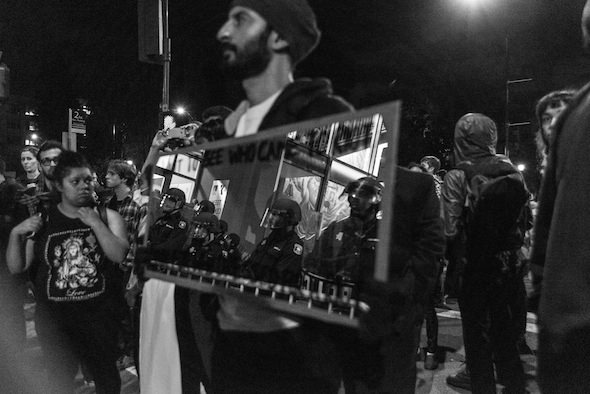
A Black Lives Matter march in Berkeley, Calif., in 2014. (Annette Bernhardt / CC 2.0)
A new survey conducted by Aizman Law Firm asked 200 police officers across the nation about race relations and policing, and found that 87 percent of those surveyed harbored negative feelings toward the Black Lives Matter (BLM) movement.
The Aizman survey, “Blue Voices on Black Lives Matter,” states:
When asked what they hoped the outcome of the movement would be, nearly 60 percent said that police brutality and racism aren’t real problems or the whole thing is overblown.
Another 11 percent said they’d like to see officers trained more on racial issues and how to de-escalate situations peacefully, and only 8 percent hoped that the department would connect with the black community and BLM.
However, the survey also found that while many officers felt negatively about BLM, few felt that race played a factor in their own feelings of safety:
[M]ore than 10 percent said that they fear for their lives on a daily basis.
Of those groups, the significant majority claimed that race doesn’t factor into their feelings of safety, while a smaller group said they felt safer with a white individual. Almost no officers said they felt safer with a black individual.
Past studies have found evidence of racial biases in policing — most recently, for example, a Harvard study based on collected data concluded that “[e]ven when the police said that civilians were compliant, blacks experienced more force.”
The Aizman survey comes as many Americans are expressing concern over the future of policing in America, as President Trump has promised to be tough on crime in inner cities — a message often charged with racial stereotypes.
Others believe Trump’s administration has shown outright opposition to BLM. “But insofar as the Obama administration was an ally to Black Lives Matter—and it was, if only through the Justice Department’s series of scathing reports on systemic racism and misconduct in police departments in Ferguson, Mo., Baltimore and Chicago—Trump has now promised, in his official capacity as the 45th president of the United States, to be its enemy,” Slate’s Leon Neyfakh wrote in late January.
BLM has begun to mobilize in response to the new administration. Brandon Ellington Patterson of Mother Jones wrote last week:
In the wake of Trump’s immigration order, BLM organizers mobilized their networks to turn out at airports to protest. The groups also fired up their social media networks to amplify calls for the release of detained travelers. BLM leaders say their strategy will evolve as more details become known about what Trump plans to do on matters ranging from policing and reproductive rights to climate change and LGBT issues. They will focus on combating what they see as Trump’s hostile, retrograde agenda—and that of right-wing politicians emboldened by Trump—primarily at the state and local levels.
Since taking office, Trump has signed executive orders reinforcing his commitment to “fight crime, gangs, and drugs; restore law and order; and support the dedicated men and women of law enforcement.”
John Raphling of The Hill notes, however, that “the vague language of the order and related policy statements from the Trump administration feel ominous because of what the president hasn’t said—that the federal government also has an important role to play in helping to ensure that police departments are accountable.”
And even police officers themselves are expressing doubts about Trump’s stance on law enforcement. The New York Times reports:
“We need not use arrest, conviction and prison as the default response for every broken law,” Ronal W. Serpas, a former police chief in Nashville and New Orleans, and David O. Brown, a former Dallas chief, wrote in a report released last week by a leading law enforcement group. “For many nonviolent and first-time offenders, prison is not only unnecessary from a public safety standpoint, it also endangers our communities.” …
The group warned that “failing to direct these resources toward our most immediate and dangerous threats risks wasting taxpayer dollars,” singling out using federal money on “dragnet enforcement of lower-level offenses.”
Trump’s opinions toward BLM and policing are unlikely to help the dissonance that the “Blue Voices on Black Lives Matter” survey uncovered.
“In stark contrast with their earlier statements that race doesn’t matter, however, 26 percent of officers said that they believe black people are more likely to be up to no good,” the Aizman survey concludes, “and 11 percent said that officers are more likely to stop, search, or react violently toward black individuals.”
Independent journalism is under threat and overshadowed by heavily funded mainstream media.
You can help level the playing field. Become a member.
Your tax-deductible contribution keeps us digging beneath the headlines to give you thought-provoking, investigative reporting and analysis that unearths what's really happening- without compromise.
Give today to support our courageous, independent journalists.

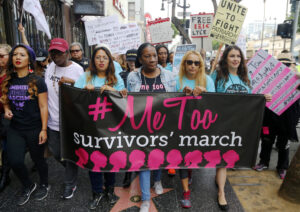
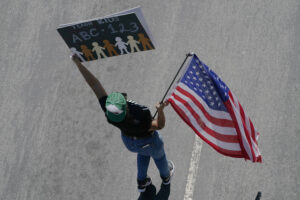
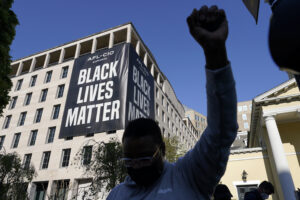

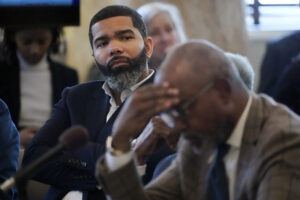
You need to be a supporter to comment.
There are currently no responses to this article.
Be the first to respond.